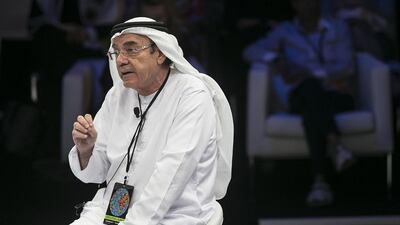The challenges involved in preserving culture in the Middle East are on the rise, after incidents of archaeological looting in Iraq and the destruction of Palmyra by ISIL.
Last month, the UAE, France and the United Nations Educational, Scientific and Cultural Organisation (Unesco), launched the International Alliance for the Protection of Heritage in Conflict Areas.
Speaking at Culture Summit Abu Dhabi during a session entitled The Different Cultures of Funding Culture: The Why and How of Cultural Preservation in the Coming Decades, Zaki Anwar Nusseibeh, Assistant Minister of Foreign Affairs and cultural adviser at the UAE Ministry of Presidential Affairs, said such a fund was necessary for protection from the “new barbarians who were tearing apart the heritage and narrative of man’s civilisation”.
Nusseibeh stressed that in the UAE, culture is not a peripheral endeavour. “It is the driving force that enables societies to achieve durable development,” he said.
He added that combined with education, the preservation, development and institutionalisation of culture is central to the long-term development strategy of the country.
Mariët Westermann, executive vice president of the Andrew W Mellon Foundation, argued that stakeholders need to be identified for preservation of culture.
“What different people believe is worth keeping and counts as art and what is considered as an abomination is all part of culture,” said Westermann.
She added that cultural heritage is not a neutral thing, and for a fund like the one being developed to succeed, “we cannot have experts flown in to tell us this is what we will keep because it is important”.
Westermann emphasised the importance of identifying stakeholders, so they can determine what is truly important and what perhaps might be left out.
Princess Dana Firas, president of the Petra National Trust, said that not only must heritage and conflict be addressed, but also heritage and crisis.
“Crisis can be this sinister daily destruction of sites that is not quite as visible and final as you see in other places,” she said.
“There is a lot of mismanagement and misuse, as well as a lack of understanding of what site integrity is. This needs to be translated into policies and instruments and tools that we could use to preserve heritage and culture.”
Zaki Aslan, of the International Centre for the Study of the Preservation and Restoration of Cultural Property, said that since 2004 the UN body was engaged in helping regional nations understand this.
“We are an international body working with the Government of the UAE to serve the whole region,” he noted.
“What we started a few years ago was working with sites that were present at places such as Petra, and also address [ing] basic issues on heritage in this particular part of the world.”
Nusseibeh said cultural preservation is an important part of the work in the UAE.
“Starting in 1962 with the Al Hili excavations and moving on to the work on historic forts such as Qasr Al Hosn, the Jahili Fort to the Al Muwaiji Fort, a lot of catalysts have been employed to bring about this development,” he said.
The institutionalisation of cultural heritage was not a recent initiative in the UAE, added Nusseibeh.
“It has been since 1969, through the first tourism department, by Sheikh Zayed, and the first museum in Abu Dhabi,” he said. “What has been happening is the UAE itself has been moving from one phase to the other recently. The first 40 years of the UAE have been the initial phase of laying the foundations and structure, and now we are moving to the global stage where big museums and global entities are making Abu Dhabi and the UAE their home.”
artslife@thenational.ae

